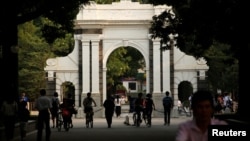Stephen Garrett, a 27-year-old graduate student, always thought he would study in China, but the country's restrictive COVID-19 policies made it nearly impossible and now he sees interest among fellow scholars wane even after China reopened.
Common concerns, he said, include restrictions on academic freedom and the risk of being stranded in China.
These days, only about 700 American students are studying at Chinese universities, down from a peak of close to 25,000 a decade ago, while there are nearly 300,000 Chinese students at U.S. schools.
Some young Americans are discouraged from investing their time in China by what they see as diminishing economic opportunities and strained relations between Washington and Beijing.
Whatever the reason for the imbalance, U.S. officials and scholars bemoan the lost opportunities for young people to experience life in China and gain insight into a formidable American adversary.
And officials from both countries agree that more should be done to encourage the student exchanges, at a time when Beijing and Washington can hardly agree on anything else.
"I do not believe the environment is as hospitable for educational exchange as it was in the past, and I think both sides are going to need to take steps," said Deputy Secretary of State Kurt Campbell.
The U.S. has advised its. citizens to "reconsider travel" to China over concerns of arbitrary detentions and widened use of exit bans to bar Americans from leaving the country. Campbell said this has hindered the rebuilding of the exchanges and easing the advisory is now under "active consideration."
For its part, Beijing is rebuilding programs for international students that were shuttered during the pandemic, and Chinese President Xi Jinping has invited tens of thousands of U.S. high school students to visit.
The situation was far different after President Barack Obama started the 100,000 Strong initiative in 2009 to drastically increase the number of U.S. students studying in China.
By 2012, there were as many as 24,583 U.S. students in China, according to data by the Chinese education ministry. The Open Doors reports by the Institute of International Education, which only track students enrolled in U.S. schools and studying in China for credit, show the number peaked at 14,887 in the 2011-12 school year. But 10 years later, the number was down to only 211.
In late 2023, the number of American students stood at 700, according to Nicholas Burns, the U.S. ambassador to China, who said this was far too few in a country of such importance to the United States.
"We need young Americans to learn Mandarin. We need young Americans to have an experience of China," Burns said.
Without these U.S. students, "in the next decade, we won't be able to exercise savvy, knowledgeable diplomacy in China," warned David Moser, an American linguist who went to China in the 1980s and is now tasked with establishing a new master's program for international students at Beijing Capital Normal University.
Moser recalled the years when American students found China fascinating and thought an education there could lead to an interesting career. But he said the days of bustling trade and money deals are gone, while American students and their parents are watching China and the United States move away from each other. "So people think investment in China as a career is a dumb idea," Moser said.
After 2012, the number of American students in China dipped but held steady at more than 11,000 for several years, according to Open Doors, until the pandemic hit, when China closed its borders and kept most foreigners out. Programs for overseas students that took years to build were shuttered, and staff were let go, Moser said.
Amy Gadsden, executive director of China Initiatives at the University of Pennsylvania, also attributed some of the declining interest to foreign businesses closing their offices in China. Beijing's draconian governing style, laid bare by its response to the pandemic, also has given American students a pause, she said.
Garrett, who is on track to graduate this summer from Johns Hopkins University School of Advanced International Studies, said he is ambivalent about working in China, citing the lack of access to information, restrictions on discussions of politically sensitive issues and China's sweeping anti-spying law. He had lived in Hong Kong as a teenager and interned in mainland China, and said he is still interested in traveling to China, but not anytime soon.
Some American students remain committed to studying in China, said Andrew Mertha, director of the China Global Research Center at SAIS. "There are people who are interested in China for China's sake," he said. "I don't think those numbers are affected at all."
About 40 U.S. students are now studying at the Hopkins-Nanjing center in the eastern Chinese city, and the number is expected to go up in the fall to approach the pre-pandemic level of 50-60 students, said Adam Webb, the center's American co-director.
Among them is Chris Hankin, 28, who said he believed time in China was irreplaceable because he could interact with ordinary people and travel to places outside the radar of international media. "As the relationship becomes more intense, it's important to have that color, to have that granularity," said Hankin, a master's student of international relations with a focus on energy and the environment.
Jonathan Zhang, a Chinese American studying at the prestigious Schwarzman Scholars program at Tsinghua University in Beijing, said it was more important than ever to be in China at a time of tense relations. "It's really hard to talk about China without being in China," he said. "I think it's truly a shame that so many people have never stepped foot in China."
Zhang was met with concerns when he deferred an offer at a consulting firm to go Beijing. "They're like, 'Oh, be safe,' or like, 'What do you mean, you're going back to China?'" Zhang said. "I feel like the (Chinese) government is trying with an earnest effort, but I feel like a lot of this trust has been broken."
Gadsden said U.S. universities need to do more to nudge students to consider China. "We need to be more intentional about creating the opportunities and about encouraging students to do this deeper work on China, because it's going to be interesting for them, and it's going to be valuable for the U.S.-China relationship and for the world," she said.
In China, Jia Qingguo, a professor of international relations and a national political adviser, has suggested Beijing clarify its laws involving foreign nationals, introduce a separate system for political reviews of foreign students' dissertations, and make it easier for foreign graduates to find internships and jobs in Chinese companies.
Meanwhile, China is hosting American high school students under a plan Xi unveiled in November to welcome 50,000 in the next five years.
In January, a group of 24 students from Iowa's Muscatine High School became the first to travel to China. The all-expenses-paid, nine-day trip took them to the Beijing Zoo, Great Wall, Palace Museum, the Yu Garden and Shanghai Museum.
Sienna Stonking, one of the Muscatine students, now wants to return to China to study.
"If I had the opportunity, I would love to go to college in China," she told China's state broadcaster CGTN. "Honestly, I love it there."





